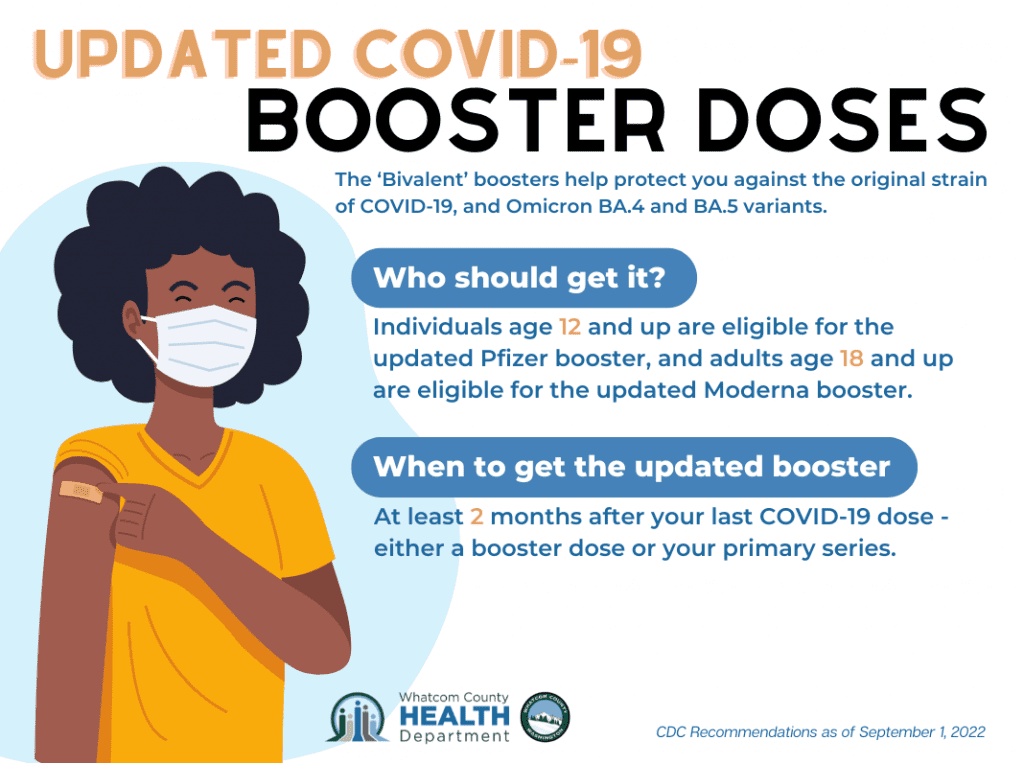Give your body extra support against the latest COVID-19 strains with a bivalent booster shot.
The boosters are called ‘bivalent’ because they help target the most recent Omicron variants circulating right now, BA.4 and BA.5, plus the original virus strain from 2020. The new boosters are available to anyone age 5 and older, as long as the person has already had their primary COVID vaccines.
While the older vaccines did a great job at preventing severe illness and death — especially in those who also obtained boosters — their protection waned over time as the virus evolved.
When Omicron arrived last winter, the strain was better able to get past our immune defenses. This was a game-changer that caused many vaccinated people to catch COVID, even though they suffered less severe illness than those who were never vaccinated. Since the bivalent booster targets Omicron, it’s as important as ever to update your COVID-19 vaccination record for better protection.

Doctor Greg Thompson, a health officer with the Whatcom County Health Department, says that while a sense of COVID-19 fatigue is understandable after two years of masks, mandates and case waves, the virus is still with us: in August alone, 15,000 Americans died from the disease.
“Many of these deaths could have been prevented through vaccines and boosters,” Thompson says. “In June, older unvaccinated Americans died at a four-times-higher rate than those who had just their primary COVID vaccines, and a whopping 14-times-higher rate than those who had received two boosters.”
Vaccines reduce the risk of severe illness and death, and subsequently reduce stress on the healthcare system, he adds. And just like flu shots are updated annually to protect against new circulating flu strains, COVID boosters have been updated ahead of another possible surge.
“COVID cases have spiked the last two winters, and may do the same this year,” says Thompson. “This winter may also be a relatively bad influenza season based on what we have seen in the southern hemisphere during their winter (our summer).”
Fortunately, people can get both their COVID booster and annual flu shot at the same time to be protected from both infections.
Who Needs It Most?
A booster is especially important if you’re at high-risk of severe disease or you spend time with anyone who is, Thompson says.
This includes people who are elderly, overweight, or have weakened immune systems. Those with underlying medical conditions like cancer, diabetes, heart, lung, or blood disorders, as well as those who are pregnant, are at higher risk of severe disease and should get a booster.
Ultimately, booster shots are for anyone 12 and older, just like the original coronavirus vaccines.
What are the Side Effects?
Similar to the original vaccines, Thompson says. However, in many people — especially those who haven’t had either an infection or booster in the last few months — side effects have typically been milder.
When Should I Get It?
You should wait at least two months since your last vaccine dose, and be fully recovered from any recent COVID infection before getting your booster. Waiting three full months after having the virus is an option endorsed by the CDC and may both increase immunity and reduce side effects in people who aren’t at high-risk of being quickly reinfected.
Where Can I Get It?
Local pharmacies and doctor’s offices that offered the original booster should carry the new variant-specific shots. WCHD pop-up vaccine clinics in Lynden and at the East Whatcom Regional Resource Center in Kendall will also offer the new boosters.
Talk to your healthcare provider about getting a booster or come to one of WCHD’s adult vaccine pop-up clinics; no insurance is required at the latter. You can make an appointment on their website, https://www.whatcomcounty.us/3530/COVID-19-Vaccines#popup, or just show up without an appointment.
Is It Really Going to Help, Though?
Boosters keep the immune system ready to fight future infections, Thompson says. Evidence so far indicates the bivalent boosters provide a stronger antibody response against Omicron than the original vaccine, and also help prevent virus growth in lung tissue.
Thompson says the vaccines to-date have shown vaccination after infection produces a stronger, hybrid immunity that is better than immunity from just infection or vaccination alone.

“I expect the protective effect from these new vaccines will be similar to what we’ve seen before —long-lasting protection against severe disease and death, but relatively shorter-lasting protection against milder infections,” he says. “With COVID-19, we’ve seen that the strongest protection against mild infection is for the first 3-6 months after a vaccine or booster — when antibody levels are at their highest.
Protection against severe disease and death is related to robust immune memory cells, which last much longer than antibodies. This is why we’re seeing that even people who had vaccines and boosters many months ago are still experiencing less severe disease and death than the unvaccinated were this summer.”
With all this in mind, consider better-arming your immune system with an updated booster. And remember to keep using the tools and habits we’ve all learned so well in the last two years: test and stay home when feeling sick and wear a high-quality mask when and where it’s most helpful.
And finally, regardless of how you perceive COVID-19’s continuing risk, remember to be kind.
“It has been a challenging few years,” Thompson says. “We need each other more than ever.”
Sponsored










































